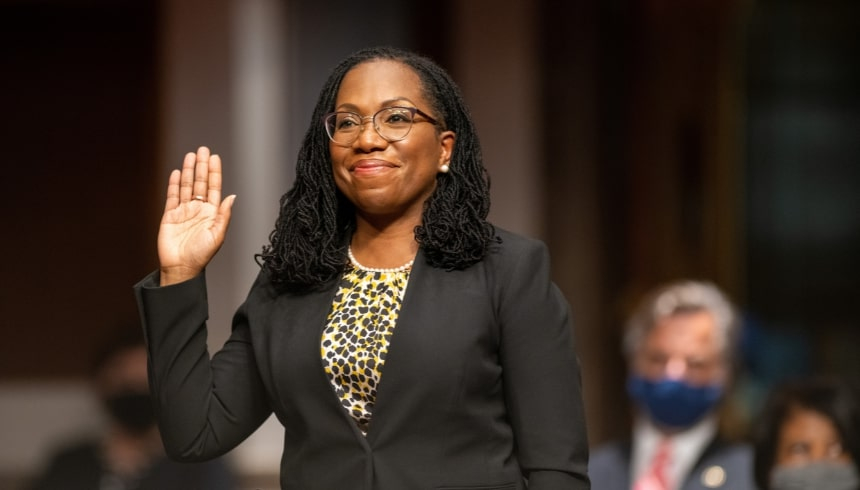Retired Judge LaDoris Cordell said she was overjoyed when the U.S. Senate votes were tallied on Thursday afternoon and Judge Ketanji Brown Jackson officially secured her elevation to the U.S. Supreme Court.
"I'm thrilled because she has made the U.S. Supreme Court look more and more like America," Cordell told this news organization in an interview.
Cordell, a Palo Alto resident and former city council member, knows more than most people about breaking barriers. In 1982, she became the first Black woman to serve on a Superior Court in northern California. Cordell was on the Santa Clara County Superior Court bench for the next two decades, retiring from the bench in 2001. She is keenly aware of both the positive and negative pressures that Jackson will experience as she begins her tenure on the highest court in the land.
The bad pressure, she said, will come from those who have bought into the negative stereotypes about people of color and expect her to fail. These people include many in the Republican Party who opposed her confirmation and who tried to characterize her during Senate Judiciary Committee hearings as soft on crime because of her experience as a public defender.
Cordell said that Jackson demonstrated during the lengthy hearings that she can withstand and effectively respond to these attacks, which Cordell said she found appalling.
"She demonstrated that she is strong, that she can always be respectful and always, as best she could at these hearings, state the way that she'd viewed the law," Cordell said.
Jackson, now the first Black female Supreme Court justice, will also experience "good pressure" from communities of color and from women who expect her to succeed. This pressure always goes hand-in-hand with being the first person to reach a particular achievement. Cordell said she believes Jackson will be able to handle the good pressure well and serve as a strong and independent justice.
"I know that she will bring a realistic perspective to the U.S. Supreme Court when they're discussing cases, that she will not be timid about expressing her views," Cordell said.
Early in her career, Jackson had served as a clerk for Justice Stephen Breyer, whom she will replace on the court after he retires following the Supreme Court's summer recess. Jackson also worked as an attorney in private practice and as a public defender before she was appointed by former President Barack Obama to serve as vice chair of the U.S. Sentencing Commission. She went on to become a federal judge in 2012, winning bipartisan support for a seat on the U.S. District Court for the District of Columbia. Last year, President Joe Biden nominated her to serve as judge on the U.S. Court of Appeals for the D.C. Circuit, an appointment that also advanced with bipartisan backing.
Her elevation to the Supreme Court proved more tumultuous, with several Republican members of the Senate Judiciary Committee citing her record as a public defender as evidence of her being soft on crime. But even though the committee deadlocked along party lines, she cleared her final legislative hurdle Thursday when the full Senate voted 53-47 to advance her confirmation. Three Republican senators — Susan Collins, Lisa Murkowski and Mitt Romney — joined every Democrat to confirm her to the court.
Cordell compared Jackson's elevation to the Supreme Court to other historic firsts, including the nominations of Thurgood Marshall in 1967 and Sandra Day O'Connor in 1981. Marshall, the first Black justice in the history of the Supreme Court, was appointed with 69 votes of support, while O'Connor, the first female justice, received 99 votes.
"The U.S. Supreme Court, which sets the law of the land, has been a segregated institution for more than 200 years. All that time it's only been open to white men," Cordell said. "We have an institution that has slowly but surely become desegregated and I think there will be more."
Cordell said she looks forward to the day when the Supreme Court sees its first Asian American and Native American justices. But while the court still has a long way to go, she called Jackson's confirmation a huge step. And the fact that her vote count was much closer than it was for Marshall in no way diminishes her achievement, Cordell said.
"Clearly this was a political vote and I was pleased to see three Republicans vote for her," she said.
The Bay Area's legislative leaders also lauded Jackson and celebrated her elevation to the Supreme Court. Rep. Jackie Speier said in a tweet that Jackson's confirmation is a "testament to her integrity, legal prowess and temperament, and grace in the face of 13 hours of baseless GOP attacks."
"The respect she commands is SUPREME!" Speier wrote.
Rep. Anna Eshoo called Jackson "one of the most qualified judges to ever be confirmed to the Supreme Court.
"She served as a federal public defender; a federal appellate judge; a federal district court judge; a member of the U.S. Sentencing Commission; and an attorney in private practice," Eshoo said in a statement. "Four words are engraved above the doors of the Supreme Court: Equal Justice Under Law. I'm confident Judge Jackson will make these words walk into the lives of the American people."



Comments